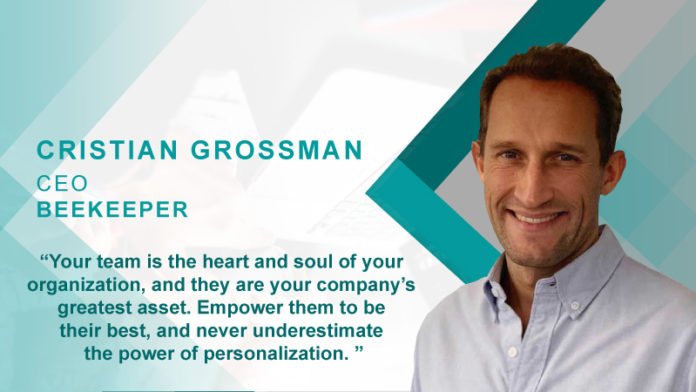1. Tell us about your role at Beekeeper.
As the co-founder and CEO, I drive the company vision, ensure alignment among teams, identify new market opportunities, work closely with the board of directors, manage investor relations, and finally, build and lead an all-star executive team to hit our ambitious business goals.
2. Can you tell us about your journey into this market?
Prior to founding Beekeeper, I worked for Accenture on high profile, international projects in the IT Strategy field. In 2011, my colleague, Flavio Pfaffhauser, and I created a chat app for college students to flirt and chat anonymously. Eventually, users began adopting the app to share information about their daily lives, so we developed the app into a community platform that we advertised as a chatroom for college students.
We began monetizing the app by selling ad space to businesses. It wasn’t long before companies were asking us if they could use this kind of platform for their own internal purposes. Our big break came in 2013 when the luxury hotel chain, Swissôtel was looking to establish an internal communication network for its team. We developed an app for their staff, and it was received so well that the company decided to roll it out to its 50,000 employees at over 120 hotels. And so Beekeeper was born.
We are specifically focusing on industries that have a high percentage of frontline workers, where a lot of manual work still exists because although non-desk workers make up a majority of the world’s global workforce, these workers have been historically underserved, with very few communications solutions available to them. For this reason, we focused our efforts on building a tool to support these frontline workers.
3. How do you think technology is changing the HR Sector?
Technology will continue to have a major impact on the HR sector over the coming years, especially with the increased use of AI in HR software. Recruiting will become more effective, compliance will be more efficient, and better analytics will certainly aid HR departments in optimizing performance management.
4. So our audience has a better understanding, can you explain how Beekeeper works?
Beekeeper helps connect all employees to the company’s internal communications network. Beekeeper is so much more than an employee chat app. This tool helps organizations streamline their operations in a number of ways.
First, it simplifies the onboarding process by providing employees with one central access point for training materials and new hire information. Second, automated workflows allow users to save time by eliminating manual repetitive processes. Third, HR managers can easily digitize their payroll process and make employee payslips easily accessible within the app.
Finally, companies can use the analytics provided by Beekeeper to gain valuable insights into their workforce. Managers can send polls and anonymous surveys to their teams to get their feedback and measure employee engagement in the analytics dashboard. We’ve built a truly robust tool to help companies connect with their teams and improve their internal operations.
5. In our research about Beekeeper we found that this platform was launched as a student social network with the name Spocal. What were the major developments you had to do in the platform to make it more suitable for companies?
Once we started selling ad space on Spocal, companies began approaching us wanting to use the platform for their own internal communication. We quickly realized we needed a solid business plan. As demand increased, we started building various community platforms for organizations like Swiss Rail Company and Global Banking Groups. These experiences provided the training ground we needed to build an enterprise team communication app like Beekeeper.
6. The Beekeeper platform is considered one of the out-of-the-box innovations in the HR Sector. Can you name a corporate technology innovation that has impressed you?
I am fascinated by innovations that are simple for the user and make life easier, yet still leverage powerful and complex technologies in the background. Like voice-powered interfaces and machine learning algorithms. The race to conquer big data in the corporate world has opened the door for services like effectUX. This platform uses complex data, algorithms, and predictive tools to help businesses analyze their data and make better business decisions that benefit the working environment for every employee. This is something we care very deeply about at Beekeeper.
Companies are also leveraging voice-powered interfaces and AI in their customer service departments to increase efficiency. Chatbots are popping up more and more in live chat, and call centers are integrating voice-powered technologies in customer calls through software that can monitor the tone and emotion of speakers on the call. While these types of innovations are still in their early stages and have some maturing to do, early business applications are promising. It will be exciting to see how businesses continue to leverage these corporate technologies in the future.
7. Do you agree that the connection gap between desk and non-desk workers was one of the major gaps in the functioning of a company? What were some of the major issues faced by companies, which were solved by Beekeeper?
Absolutely. While there are a number of internal communications software options available on the market, up until a few years ago, there were very few solutions for communicating with frontline workers. It’s a gap we have squeezed into.
Some of the major issues faced by companies with a large distributed workforce include high employee turnover, low productivity, and a general feeling of disconnect between desk and non-desk workers. Beekeeper helps solve these problems by providing a secure, mobile-first communication tool that offers employees at every level of the company a voice within their organization.
8. What advice would like to give to other startups?
Always put people first. Your team is the heart and soul of your organization, and they are your company’s greatest asset. Empower them to be their best, and never underestimate the power of personalization. Even though Beekeeper is a global company that’s growing rapidly, I still make it my aim to get to know every employee on a personal level.
9. What is the vision on which you and Beekeeper are working on?
Our vision is to be the leading digital workplace solution for the non-desk workforce. Our aim is that 500 million employees will use our app by 2030.
10. What are some major developments you are planning?
We’re always working on expanding the Beekeeper ecosystem. Our Beekeeper platform is its operating system and can be used for running apps – ours and also third-party apps either from customers or independent software developers to create additional functionality. This ecosystem approach is a way of accelerating our expansion.
Internally, we are growing very fast. Our aim is to build out a 100-person software development team in Poland, and we’re growing our teams at our other operational bases around the world. Our goal is to grow to over 500 people by 2030. On the product side, we have some exciting new functionalities like Shift Schedules and many others coming out later this year. Stay tuned!
11. Can you tell us about your team and how it supports you?
As one of Europe’s fast-growing startups, the Beekeeper team is an international, agile, and dedicated team of SaaS leaders who are committed to the vision of making Beekeeper the #1 app for the non-desk workforce. My team has helped Beekeeper create the authentic, dynamic company culture that Beekeeper is known for. Our flat organizational structure means we recognize the power of every individual employee and encourage growth and autonomy.
I like to give my team the freedom to implement their own solutions and take ownership over their ideas and initiatives. Our driven, talented team is what has enabled Beekeeper to sustain the kind of rapid growth that can sometimes invite organizational chaos into a young startup. Having the right team behind you means everything.
12. Which book are you reading these days?
a. Factfulness: Ten Reasons We’re Wrong About the World — and Why Things are Better Than You Think by Hans Rosling. This book has great insights and facts on the amazing progress humanity has made in the last few decades in spite of a general negative perception of the overall trajectory of the human species and our impact on the world Sometimes you just need to set the cynicism aside and try to focus on the positive.
b. Flow by Mihaly Csikszentmihalyi, a book that emphasizes the importance of focus and how to build an environment for yourself that allows you to maximize your potential and do great work.
13. Can you give us a glance at some of the applications you use on your phone?
The apps I use most are sport tracking apps like Garmin Connect, Training Peaks, and Strava. I also like Brain.fm, Medium, and Audible a lot. And last, but not least, of course I use Beekeeper to communicate internally with our teams.
14. We have heard that you have a very fun work culture. Can you share some of the fun pictures of your workplace?
Even though we’ve grown considerably over the past few years, we’ve still got that initial start-up vibe to keep the atmosphere in the office vibrant, fresh, and innovative. Here are some photos that illustrate what it’s like to work at Beekeeper.


Cristian Grossman CEO, Beekeeper.io
Prior to founding Beekeeper, Cris worked for Accenture on high profile international projects in the field of IT Strategy for the financial and public sectors. Cris studied Chemical Engineering and got his Ph.D. in Electrical Engineering, both at ETH Zurich. Before moving to beautiful Zurich, Cris was born and raised in an entrepreneurial Swiss-Mexican family in Mexico City.












